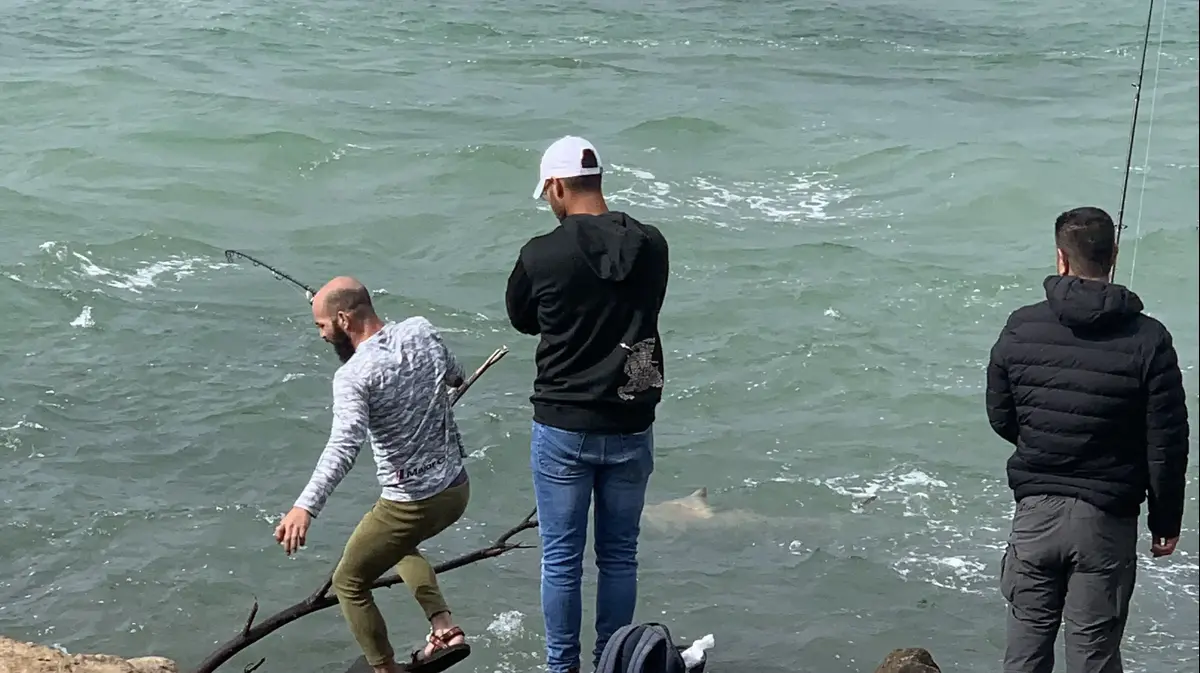Shark fishing in Hadera, March 2024/from the SeaWatch app
Every winter there is a very unique phenomenon of sharks clustering around the cooling water outlet of the coastal power plants in the Israeli Mediterranean Sea, which of course arouse public interest and attract a large crowd of spectators who come to witness the sharks from the beach, diving, snorkeling, on a SUP, kayak or motorboat.
In addition, in the area where the sharks gather, there is a daily fishing activity.
Last Friday, the Nature Conservation Society's SeaWatch application, intended for reports on hazards such as fishing violations, pollution, ghost nets and damage to protected animals in real time, reported on two fishermen who caught a shark unintentionally.
Also attached to the report is documentation that shows how the two pull the shark to the shore in order to release the hook stuck in its mouth, before releasing it back into the water, however, according to Aterat Shabtai, a marine ecologist at the Society for the Protection of Nature, it is not clear how the experience of the shark's capture and injury from the hook will affect the continuation of its breeding season and on his ability to obtain food.
"The fishermen acted relatively quickly and did not hesitate to release the shark after catching it. Sharks, like the other cartilaginous fish, are declared in Israel as a protected nature value and therefore do not suffer from their targeted fishing and are not the target for the fishermen there. At the same time, the conditions in the field, which include a great variety of unregulated activities pose a risk to both the sharks and the various users," she adds.
A finning shark at the Hadera power plant dragging fishing lines tangled around it, winter 2022/The Society for the Protection of Nature, Bar Sternbach
The fishermen who accidentally caught the shark and tried to return it to the sea/The Society for the Protection of Nature, from the SeaWatch app
The sharks in Israel - "protected natural value"
About three years ago, the Society for the Protection of Nature formulated a proposal to regulate human activity in the sensitive area of Hadera and Ashdod, in order to protect the sharks and prevent safety conflicts in the area: a seasonal declaration of the site as a "protected natural value" by the Minister of Environmental Protection and Interface Management in the area (fishing ban Seasonal near the sharks, visitor interface) by the Nature and Parks Authority in the relevant season only.
However, today there is still no regulation of the variety of activities in the field, and the pressure of the visitors is even increasing every year as the phenomenon gains popularity among the public.
"Cases like the one we saw last Friday make it clear that allowing fishing in the shark aggregation area poses an unreasonable risk to the sharks, as protected natural values whose population is in danger of extinction. The Society for the Protection of Nature repeats and calls for the regulation of activity in the aggregation areas only seasonally in order to reduce the possible harm to sharks as a result of fishing and viewing activities which is not controlled. This regulation holds a golden opportunity to raise awareness of the need to protect shark populations in the world and to promote eco-tourism," says Alon Rothschild, director of biodiversity and the "blue half" - the marine program of the Society for the Protection of Nature.
A shark in and around Hadera from snorkelers photographing it/The Society for the Protection of Nature, Bar Sternbach
The SeaWatch application of the Society for the Protection of Nature is designed to streamline and strengthen law enforcement and hazard prevention in the Mediterranean Sea and the Gulf of Eilat, by increasing public awareness and decision-makers of the conservation challenges at sea and forwarding complaints about hazards in real time to the enforcement agencies.
So far, about 16,000 sailors have downloaded the app and about 4,500 reports have been received.
In the application, you can report marine hazards such as illegal fishing, injured animals, pollution, waste, traveling on the beach and dangerous sailing.
In addition, in the observation area you can send observations of algae and animals such as fish, invasive species, sea turtles, marine mammals and more.
The reporter's contact information remains confidential to the public.
The application works in cooperation with the treatment and enforcement agencies in the Mediterranean Sea and the Gulf of Eilat, where all reports are immediately forwarded to the enforcement agencies by SMS and email that includes all the details of the event.
For more information about sharks in Israel,
download
SeaWatch
and report on hazards at sea
More on the same topic:
sharks
Hadera
Animals

